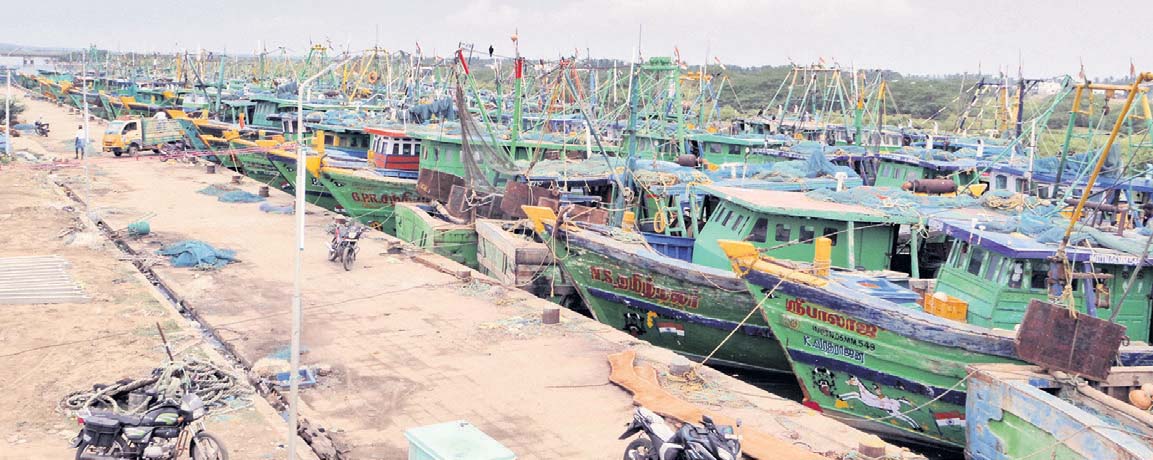What Does a Fishing Harbor Do to Fisheries? A Note on Pazhayar Harbor
“We [artisanal fishers] have lost our space [the beach landing site], firstly due to the construction of this fishing harbor in Pazhayar village of Nagapattinam district, Tamil Nadu, India. We were then slowly pushed out of this harbor by the mechanized trawlers and ring seine crafts.” This lament came from Saravanan (pseudonym), a Fiber Reinforced Plastic (FRP) boat owner. Left with no space, he states that they have been forced to park their crafts on the banks of the Buckingham Canal, a mile away from the shore and near the mangrove forest. Their pleas to the bureaucrats and local politicians to construct wooden platforms for landing goods also fell on deaf ears.
This particular case study forces us historians and anthropologists to ask critical questions regarding the underbelly of infrastructural expansion. Such expansion has been instrumental in selling modernist dreams about liberal equality, progress, and economic growth while reproducing unevenness, power, and economic deprivation amongst the fishing communities. As Appel, Anand, and Gupta have argued in the context of Michigan's racial politics, “infrastructure is a terrain of power and contestation.” 1 The frenzied race for expanded investments in megaprojects and the reliance on increasing techno-scientific complexity as a means to “leverage the future" have only deepened existing societal inequalities. 2 By drawing on some of these critical interventions, this paper will sketch the differentiated experiences of the artisanal and women fishers who are caught in the violence of the physical and social detritus created by different capitalist projects, disembedded from their existing social and ecological contexts and drawn into cycles of indebtedness and resource conflicts.
Pazhayar village is located on the mouth of river Kollidam at the northern end of Kaveri Delta (Kaveri is an Indian river flowing through the states of Tamil Nadu and Karnataka), creating a natural harbor with an estuary rich in biodiversity. It was once an artisanal fishing village where the customary governance (caste/ur panchayat 3 ) took care of the coastal commons and fisheries’ management. The advent of the fishing harbor in the 1980s paved the way for Pazhayar fishers to expand their capacity through trawling and shrimp farming. Given the promise of an interconnected world, greater economic growth, and prosperity, the then-government of Tamil Nadu utilized World Bank aid to expand the capacities of the harbor so that it could accommodate the growing complexities of financial and managerial operations as well as the integrated management and development of fisheries, shrimp farming, and aquaculture.

Fig. 1: Medium sized trawl boats parked at Pazhayar harbor (Photo by the author, 2021).
Some fishers – mostly the rich fishers who have the capacity to mobilize credit and the new generation of young educated youths – visualized development in the form of the modernization of fishing fleets and the construction of physical infrastructures like the fishing harbor, breakwater, and fish processing plant. Through this they aspired to be a part of the global economy of fish trading. However, our ethnographic research has revealed that the rhetorical positioning of the fishing harbor as a “technocratic ideal” tethered to foreign trade by the state and rich fishers has only worked to conceal the latent tensions between different groups of coastal communities.
Over the last decade, the ring seine 4 fishery has contributed to the diversification of crafts and gears, absorbed reserve labor power from the nearby agrarian regions, and supplanted the mechanised trawler fishers from the control of the harbor. 5 The use of this technology has particularly targeted the artisanal fishers' control over species and fishing zones. Moreover, with the coming of big traders who possessed superior capacities to procure fish in large quantities, advance contracts, and bankroll huge volumes of credit, the women fish vendors were caught in a disadvantageous position and forced to become laborers at the processing plants. Due to these simmering conflicts between artisanal, trawler, and ring seine fisheries, the Tamil Nadu state government found a short-term solution and enforced a ban on the ring seine fishing practices in 2021. However, the law and order approach of the state has failed to address the “splintering effects of infrastructural systems” 6 on the fishermen's livelihoods and coastal environments. Far from being universally beneficial and homogenous, such systems pushed certain social actors and practices into an unending crisis situation.
Arunkumar A S, Postdoctoral Fellow, French Institute of Pondicherry, Puducherry, India. Email: arunkumar.as@ifpindia.org
Prabhakar Jayaprakash, Affiliated Researcher, French Institute of Pondicherry, Puducherry, India. Email: prabhakar.jp@ifpindia.org
Senthil Babu, Researcher, French Institute of Pondicherry, Puducherry, India. Email: senthil.babu@ifpindia.org
Bhagath Singh, Postdoctoral Fellow, French Institute of Pondicherry, Puducherry, India. Email: bhagath.singh@ifpindia.org
Shakila H, Affiliated Scholar, French Institute of Pondicherry, Puducherry, India. Email: saishaki251998@gmail.com
Nithya K, Affiliated Scholar, French Institute of Pondicherry, Puducherry, India. Email: nithanthro@gmail.com